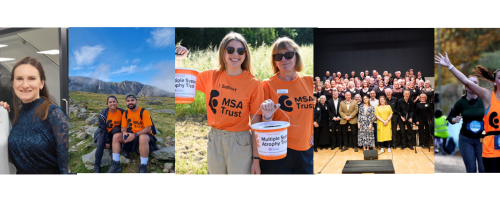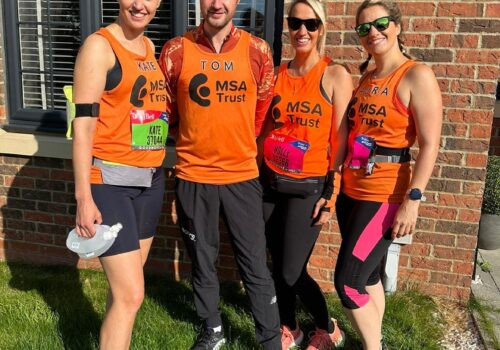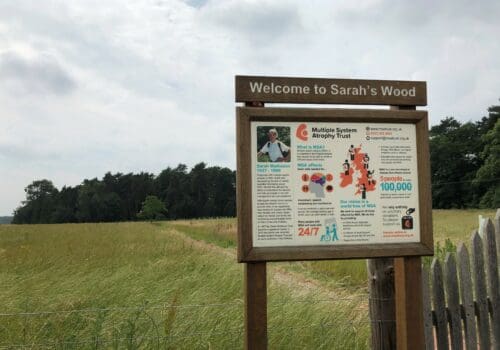A Deep Dive into MSA Research at the 2024 Symposium
In February 2024, we successfully held our second MSA Research Symposium, jointly hosted by the MSA Trust and UCL Queen Square Institute of Neurology. This event was organised by Dr Viorica Chelban from the Neurogenetic Lab at UCL Institute of Neurology in partnership with the MSA Trust and sponsored by Theravance Biopharma and Ionis Pharmaceuticals. The symposium focused on the early stages of Multiple System Atrophy (MSA), exploring advanced diagnostics, biomarkers, and interventions. We were thrilled to welcome over 120 attendees, encompassing a wide spectrum of expertise including clinicians, basic scientists, clinical research professionals, specialist nurses and industry partners highlighting the event’s broad appeal and interdisciplinary approach to tackling MSA.
The symposium began with opening remarks from Professor Sonia Gandhi (Francis Crick Institute & Institute of Neurology, London), who shared the bold vision of MSA Trust to find a cure for those affected by MSA, setting the foundation for a day full of constructive discussions. Professor Gandhi also chaired the first session, which focused on highlighting advances in genetics and biomarkers research in MSA.
In the session, Professor John Hardy (UCL Institute of Neurology, London) provided an overview MSA genetics, emphasizing the need for improved data sharing and the collection of longitudinal (long-term) data to advance genetic research in this field. Professor Claudio Soto (University of Texas Medical School, USA) shared recent advances on how synuclein seed amplification assays may play a crucial role in allowing differential diagnosis of those affected by alpha-synuclein related conditions such as Parkinson’s disease and MSA – this is a laboratory test done on a sample of cerebral spinal fluid that can detect the protein that causes MSA.
The second session focused on alpha-synuclein structure, pathways, genetic risks associated with MSA and was chaired by Professor Henry Houlden (UCL Institute of Neurology, London). In this session, Professor Stephan Gentleman (Imperial College London) presented his latest research findings into characterizing different alpha-synuclein strains and their implications for MSA as a unique synucleinopathy – looking to see if they can get a clearer picture on how MSA looks in the brain an map this to what clinical symptoms a person has.
Professor Gandhi explored the role of oligodendrocytes – the cells in the brain where the protein that causes MSA clumps together in synucleinopathies, while Dr. Maria Xilouri (Biomedical Research Foundation of the Academy of Athens, Greece) shed light on targeting autophagy (the way the body clears any damaged cells) for combating alpha-synuclein-related pathology. Dr Viorica Chelban (UCL Institute of Neurology, London) provided latest updates on the role of genetic testing in the MSA clinic with a focus on challenging presentations of MSA. Before the lunch break, Dr Christopher Kobylecki (Manchester Centre for Clinical Neurosciences, Salford) chaired the third session “MSA Research: From Patient to Bench and Back to the Patient” featuring discussions on best practices in establishing a biobank for neurodegenerative disease research by Dr Amanda Heslegrave (UCL Institute of Neurology, London), the latest in neuroimaging tools for MSA diagnosis (Prof Nicola Pavese and Dr Dr Jacopo Pasquini, Newcastle University) and Professor Anja Lowit (Stratchclyde University, Glasgow) addressed communication difficulties and provided data from new research looking into improving communication in MSA patients.
The afternoon sessions were dedicated to discussing clinical challenges in diagnosing MSA in the early stages and updates on ongoing MSA drug trials. The fourth session chaired by Professor Michele Hu (University of Oxford, UK), involved discussions from Wendy Phillips (Addenbrooke’s Hospital, Cambridge, UK) on functional neurological disorders presenting as clinical MSA and Professor Kailash Bhatia (UCL Queen Square Institute of Neurology, UK) offered insights into early-stage disease mimics, clinical challenges and diagnostic pathways. Dr Yee Yen Goh (UCL Queen Square Institute of Neurology, UK) presented clinical markers of progression and prognosis in MSA while Dr Valeria Iodice introduced the autonomic prodromal study (QSA-Prodromal) that was recently launched, aimed at identifying people with MSA much earlier.
The symposium concluded with a session about ongoing MSA drug trials, chaired by Professor Nick Wood (UCL Institute of Neurology, London), where Dr Iodice presented analysis of ampreloxetine treatment for neurogenic orthostatic hypotension in MSA patients and the current CYPRESS trial.
Katy Meilleur (IONIS Pharmaceuticals) provided an update on the antisense oligonucleotide therapy for MSA: the Horizon Trial. In their closing remarks, Professor Wood and Professor Bhatia reflected on the day’s stimulating discussions, underscoring the significant progress and ongoing momentum in MSA research, showing the collective commitment towards advancing our understanding and treatment of this complex condition.
This event marked a significant milestone in the collaborative efforts to understand and combat MSA, providing opportunities to network throughout the event enabling attendees to strengthen current collaborations and forge new connections. The symposium provided a valuable opportunity to showcase recent advancements in MSA research while also bringing together a community focused on addressing this challenging condition.
Testimonials
Thank you for an excellent meeting. The breadth of the presentations was fascinating and I learnt a lot. I also know that some of my younger colleagues found it particularly useful for networking and getting useful input for their research.
Thoroughly enjoyed meeting you all and the fact that I was able to follow all the sessions without a science background just shows how accessible you all made your fantastic research to attendees.
It was a pleasure to attend such an informative and well-planned research symposium with experts in the field of MSA.
It was a very well-organized, well-balanced, high-quality day of scientific presentations.
The Symposium was really well organized, and the topics of the presentations covered both basic and clinical aspects of the disease. Easy to follow and nice discussions afterwards.
Great location, in the center of London and a lot of food/drinks!
I thought this was an excellent programme covering a wide range of relevant research topics. Updates on SAA and new trials were especially relevant.
Disclaimer: The views and opinions expressed in the blogs published on these pages are those of the authors and do not necessarily reflect the official policy or position of the MSA Trust.




